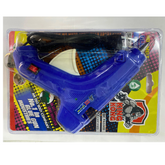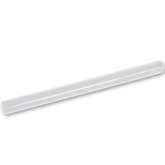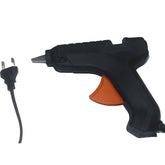What Are Hot Glue Guns
Summary
Do you want to Upgrade your crafting and DIY game with essential guide to hot glue guns? You are at the right place, In this blog post you will learn everything from what they are, the different types of glue sticks, how to use them, and how to choose the best one for your needs. Finally you will discover the versatility and common uses for this handy tool.
What is A Hot Glue Gun?
A hot glue gun heats and melts solid glue using an electric heating element. Once the adhesive has melted, it can be sprayed onto a target using the gun's nozzle.
The original purpose of glue guns was to attach leather-soled shoes, but they are now widely utilized by DIY enthusiasts, tradespeople, crafters, and many other professionals across a wide range of industries. The hot glue is easily moldable and peelable, making it perfect for quick fixes.
Fig. 1. Typical Glue Gun
Glue Stick Materials
Typically, hot-melt glues are made of a single basic substance with a variety of additions. The composition is often designed to have both a melt temperature that is sufficiently high and a glass transition temperature that is lower than the lowest service temperature.
Maximum crystallization should be achieved while staying within permitted shrinkage bounds. For a given application, the melt viscosity, crystallization rate, and associated open time can all be customized. Higher bond strength is typically implied by a faster crystallization rate.
Amorphous polymers are typically only used as modifiers in hot-melt adhesives since they would need excessively high molecular weights and, hence, unreasonably high melt viscosities to achieve the qualities of semicrystalline polymers.

Fig.2. Glue stick materials
Most glues contain polymers, which are long chains of repeating molecules. EVA, polyesters, polyethene, polyamide, polyolefin, and ethylene-methyl acrylate are among the polymers most frequently utilized in hot glue sticks (EMA).
Depending on the type of molecule and chain length, various polymers provide glues of various qualities. Strength, flexibility, heat resistance, and viscosity are a few examples of these qualities. The glue often has a higher viscosity, strength, and flexibility with a larger polymer content.
Types of Glue Gun
1. Industrial Pneumatic (Spray) Glue Guns:
Pneumatic adhesive guns, commonly referred to as spray guns, pressurize and dispense glue for speedy or one-handed operation. In industrial production, spray glue guns are in handy when you need to quickly cover a large surface area.
2. Industrial bulk glue guns:
Bulk glue guns are hot melt adhesive handling glue guns. They are most helpful when you are working on complicated applications and cannot frequently take breaks to refuel.
How to Work with a Glue Gun?
Step 1: Check to see if there is any residue on the nozzle and clean it.
It is necessary to complete this simple procedure while the hot glue gun is still unplugged. If the gun has been fired before, clean the nozzles. A clogged nozzle can prevent any or very little hot glue from discharging from the gun. Torn the adhesive remnant left over from the prior use with the pin.
Step 2: Load the glue stick material
The glue that is melted by a gun and then utilized as the adhesive is the same glue that you would have received with the gun. From behind, in a designated spot, the glue stick is inserted into the glue gun. Although some glue guns include an automatic system, all hot glue guns require manual loading.
Step 3: Plugin the hot glue gun
Now that the glue is filled with a glue stick substance. Plug the hot glue gun into the outlet and wait for a few seconds for the glue to start heating up,
Step 4: Press the trigger
The glue gun stick will melt once the gun reaches the correct temperature. Keep the nozzle positioned where you want it to stick and gently squeeze the trigger. Never touch the hot glue with your hands.
How to choose the Best Glue Gun?
Identifying the type, you require is the first step in choosing the best glue gun for you. Hot melt and low melt industrial glue guns are the two main varieties. When we use the word melt, we refer to the temperature necessary to melt the applied glue.
Low-melt glue guns melt and apply glue at lower temperatures, roughly 250 degrees Fahrenheit. Hot melt guns, however, operate at greater temperatures of about 385 degrees. While most industrial glue guns work with hot-melt glue sticks, low-melt glue guns are used for delicate materials like fragile upholstery.
Hot melt glue guns are the best option for most industrial applications. In general, hot melt glue guns are more effective and better suited for extensive industrial uses, Additionally, there are more industrial hot melt glue gun solutions available for a wide range of tasks.
When working with materials that can't take the temperatures of hot melt glue, low-melt glue guns come in handy. Low-melt glue guns are typically more appropriate for DIY projects and crafts.
Hot melt guns offer a stronger connection than low melt guns, work quicker, are cleaner, and dry just as soon. A hot melt glue gun will perform better unless you're working with sensitive materials.
Common Uses of Hot Glue Guns
Construction and woodworking:
Hot melt adhesives are used for laminate bonding, cabinet manufacture, furniture production, etc. and have a great affinity for wood products. Hot melt adhesives are used extensively in the construction sector, especially for the installation of flooring, windows, and doors.
Manufacturing
A variety of manufacturing processes involve hot melt adhesives. Printers of magazines and paperback books rely on the adhesive's capacity to create flexible, long-lasting bindings.
Numerous disposable hygiene items, including diapers, are made of non-woven fabrics, and put together using hot melt glues. Hot melt technology is frequently used to install synthetic textiles in cars, mobile and fixed residences, furniture, etc.
Shipping & Packaging
Paperboard packaging such as retail cereal and cracker boxes, beer and wine boxes, frozen food containers, etc., is made with hot melt adhesives. Hot melt is utilized in cartooning applications of all sizes, from small boutique shippers to large-scale producers, and it is applied with manual guns and automatic applicators.
Electronic:
Hot-melt adhesives are now being used by electronics producers to assemble equipment boxes and secure parts like wiring. These adhesives are often applied by robots. Tape is being replaced by hot-melt adhesives in the assembly of displays, covers, batteries, etc.
To start experimenting and playing around you can get your glue gun from Robocraze
Conclusion
A hot glue gun is a versatile and indispensable tool for any DIY enthusiast, crafter, or handyman. With its quick and robust bonding capabilities, It can take on many projects, from home repairs to creative endeavors.
So, whether you're a seasoned pro or just starting out, invest in a high-quality hot glue gun and unlock the full potential of your imagination. Remember, the right hot glue gun can make all the difference!
If you appreciate our work don't forget to share this post and leave your opinion in the comment box.
Please do check out other blog posts about Popular electronics
Make sure you check out our wide range of products and collections (we offer some exciting deals!)








